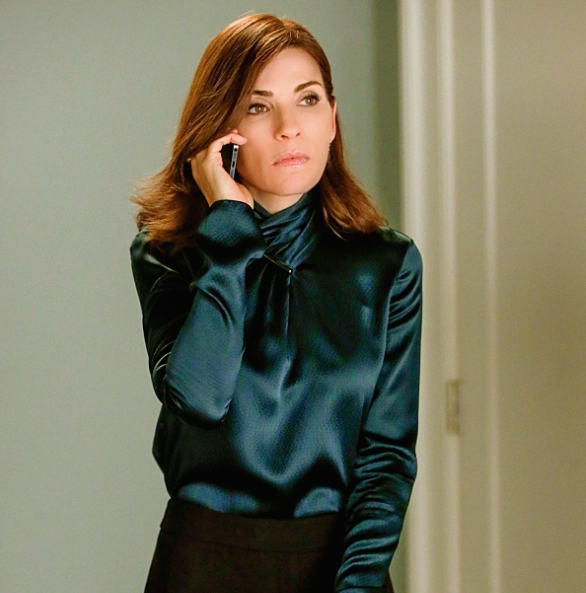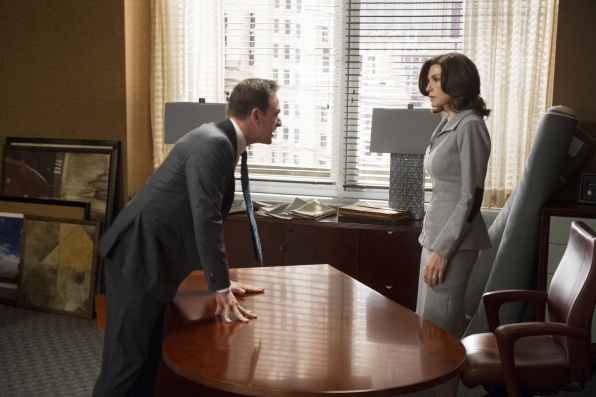
“I’m not your superhero, Mr. Elfman. If you want to go find someone to restore your faith in humanity, don’t waste my time. Or yours.”
With this line in season six, episode four of The Good Wife, protagonist Alicia Florrick (Julianna Marguiles) levels with herself and her new campaign manager. The show’s central premise places Alicia in one emotionally wrenching spot after another. After her husband, Illinois State’s Attorney Peter Florrick (Chris Noth), is caught sleeping with prostitutes and jailed for corruption, Alicia, a mother of two, returns to work at law firm Stern, Lockhart, and Gardner, where she quickly silences her doubters and navigates some intense sexual tension with her boss, all the while deciding if she should stay with her husband. Alicia Florrick is an antihero in the guise of a saint to her audiences both in the show and outside of it, making her move into politics this season perfectly fitting. She may not put on a porkpie hat to prove it, but “Saint Alicia” has been engaging in moral dualism from the show’s start.
The Good Wife is not interested in presenting Alicia Florrick as a perfect feminist icon, and it’s all the more empowering for its realistic portrayal of a flawed character. The show nearly always casts her in a marginally flattering moral light, but it also reflects the difficult choices and sacrifices anyone must make in order to climb the ranks of a major Chicago law firm. Whether she’s representing killer Colin Sweeney (Dylan Baker) and drug lord Lemond Bishop (Mike Colter), using her corrupt husband’s influence to win promotions and clients, or betraying her former lover and boss Will Gardner (Josh Charles) in a major coup, Alicia Florrick can’t escape the burdens of ambition. Marguiles’ performance, perfect in its subtlety, only occasionally reveals Alicia’s hesitation to act. It’s usually pure determination, skipping the hand-wringing and facing the consequences. Her bad behavior is easier to overlook, because many viewers–-myself included–-want a feminist heroine who will kick ass in court as a powerful attorney, anchor her families at work and at home, and verbally assassinate anyone who suggests she can’t “have it all.”
The female perspective of The Good Wife plays a role in its status as an overlooked gem. It puts its female characters at the forefront, presenting a cast diverse in age and race, from commanding senior partner Diane Lockhart (Christine Baranski) to sharp and sexy investigator Kalinda Sharma (Archie Panjabi). The central setup of the show wears domesticity on its stylish sleeve. For this it immediately loses points in the overwhelmingly male game of “prestige” TV, which usually focuses on a male protagonist struggling to mediate their masculine instincts with a world that demands self-control (see Mad Men and Breaking Bad, two excellent shows that deserve almost every ounce of praise showered upon them). Alicia Florrick is similar to these antiheroes in many ways, but because women in the media are so often portrayed as idealized figures, helpless victims, or ice queens, her more complex character–marked by both good intentions and cutting ambition–is often ignored. Alicia’s story is one of self-actualization, but showrunners Robert King and Michelle King don’t gloss over the fact that Alicia’s rise comes at a cost to others. She may be able to justify betraying her colleagues, covering up corruption, and defending murderers as “just part of the job,” but the tolls of her actions are easy to see in both Alicia’s personal life and her often tense relationships in the workplace.

The Good Wife also stands in contrast to other prestige dramas in its location on CBS. The so-called Golden Age of Television has been largely confined to cable, with strongholds like HBO and AMC producing most of the Emmys bait. However, for every lauded Breaking Bad, there is a middling, self-serious Halt and Catch Fire, and The Good Wife writers are not afraid to poke fun at their cable competitors. Alicia has in the past two seasons become addicted to Darkness at Noon, a schmaltzy parody of machismo-filled cable dramas like Low Winter Sun and the hugely acclaimed True Detective. The fundamental difference between these shows and The Good Wife is that the latter refuses to take part in the self-important philosophizing of the former. Instead, the show pushes its plot and characters forward, leaving the morality games to its audience–the hectic law firms the show depicts have little time for heady monologues or philosophical preciousness. Instead, corporate takeovers, rigged elections, and grand juries propel each episode. Concrete action is the show’s game. Moral questions are always implied, but they are grounded by constant action.
It’s a testament to the show’s writing that none of this drama feels manufactured. The Good Wife references contemporary technology and culture in ways that rarely feel pandering or pasted in. It’s managed to include storylines about Bitcoin and the NSA without seeming like aging hipsters trying to keep up with the kids. Instead, the loss of privacy and the increasing pace of the world create a palpable technological dread familiar to anyone who has ever regretted hitting the “send” button. Alicia’s return to the modern, brave new workplace is marked by her surprise at how much more complicated life becomes with the tools that are supposed to simplify things. It’s thrilling to see the show’s characters grapple with, and occasionally overcome, the obstacles of a world where no mistake is ever forgotten. The show’s stakes are always high, and even the most powerful characters are vulnerable.
The Good Wife exists in television limbo, between the prestige cable drama and the standard, case of the week-based network procedural in the vein of Law and Order. In straddling the two genres, the show misses out on deserved popular and critical attention. Until a friend forced me to watch it, I thought The Good Wife was a program for middle aged women to live vicariously through–an assumption that is tragically widespread even among television lovers. Whether this view is a product of poor marketing, the show’s network home, or just plain sexism, it’s wrong. Alicia Florrick’s story is every bit as compelling as, and more relevant to our fast paced world, than any other on the air.
***
The Good Wife is currently airing its sixth season; Sundays at 9 on CBS.
Photos courtesy of http://www.cbs.com/shows/the_good_wife/photos/
